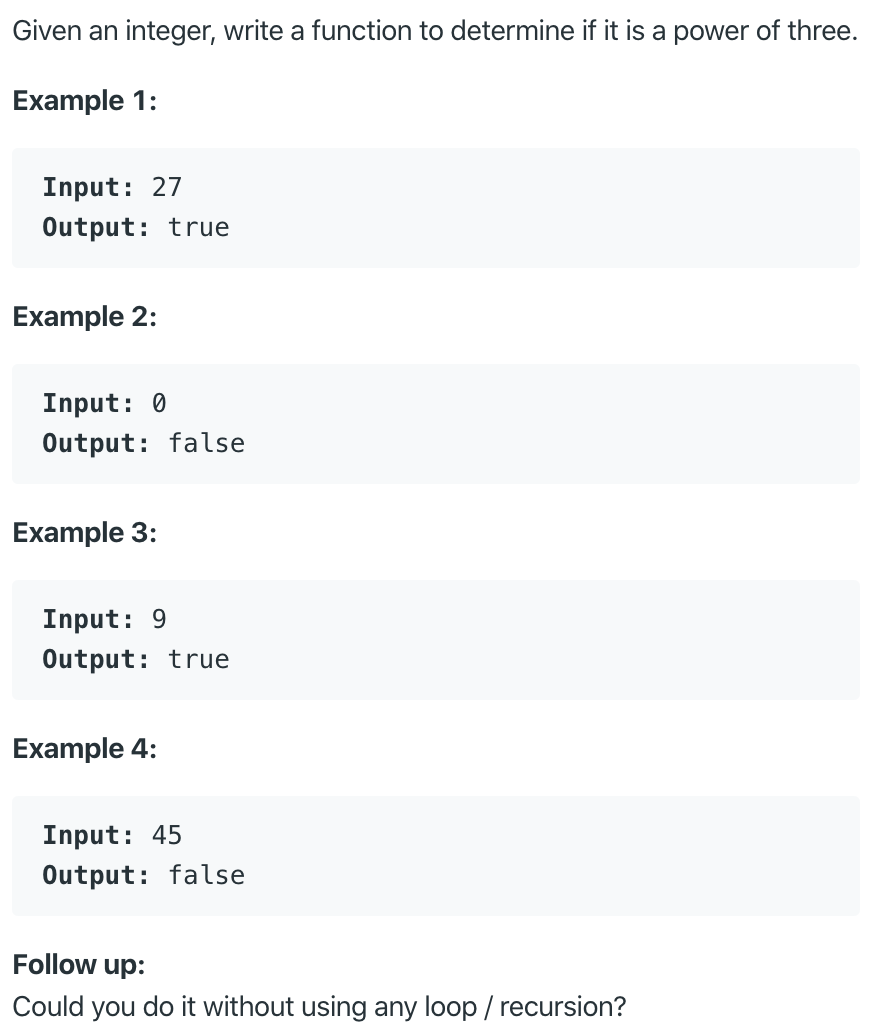Power of Three
franklinqin0 Math

# Solution
# Vanilla Iteration
Could also do in recursion instead of while loop but omitted.
We could either increase or decrease w/ time and constant space.
# Increase
We could increase acc till it's equal to or larger than n.
def isPowerOfThree(self, n: int) -> bool:
if n < 1:
return False
elif n == 1:
return True
acc = 1
while acc < n:
acc *= 3
if acc == n:
return True
return False
1
2
3
4
5
6
7
8
9
10
11
2
3
4
5
6
7
8
9
10
11
# Decrease
We could decrease n till it's equal to or smaller than 1.
def isPowerOfThree(self, n: int) -> bool:
if n < 1: return False
while n > 1:
n /= 3
return n == 1
1
2
3
4
5
2
3
4
5
# Follow Up
Could you solve it without loops/recursion?
# Modular Arithmatic
In __init__ method calculate self.maxPowerOfThree to be 1162261467, the largest power of 3 smaller than .
This solution of using maxPowerOfThree % n only works for prime n's. Here is the proof.
There exist a , and a non-prime , where . satisfies condition but is not a power of .
class Solution:
def __init__(self):
max_int = 2**31 - 1
self.maxPowerOfThree = 3
while self.maxPowerOfThree < max_int/3:
self.maxPowerOfThree *= 3
def isPowerOfThree(self, n: int) -> bool:
return n > 0 and self.maxPowerOfThree % n == 0
1
2
3
4
5
6
7
8
9
2
3
4
5
6
7
8
9
Or, could calculate self.maxPowerOfThree in this way:
class Solution(object):
def __init__(self):
max_int = 2**31 - 1
from math import log, floor
self.maxPowerOf3 = int(3**(floor(log(max_int, 3))))
def isPowerOfThree(self, n):
"""
:type n: int
:rtype: bool
"""
if n < 1:
return False
return self.maxPowerOf3 % n == 0
1
2
3
4
5
6
7
8
9
10
11
12
13
14
2
3
4
5
6
7
8
9
10
11
12
13
14
# Integer Limitation
In __init__ method calculate all powers of 3 smaller than .
class Solution:
def __init__(self):
max_int = 2**31 - 1
self.powerOfThree = [1,3]
while self.powerOfThree[-1] < max_int/3:
self.powerOfThree.append(self.powerOfThree[-1]*3)
def isPowerOfThree(self, n: int) -> bool:
return n>0 and n in self.powerOfThree
1
2
3
4
5
6
7
8
9
2
3
4
5
6
7
8
9